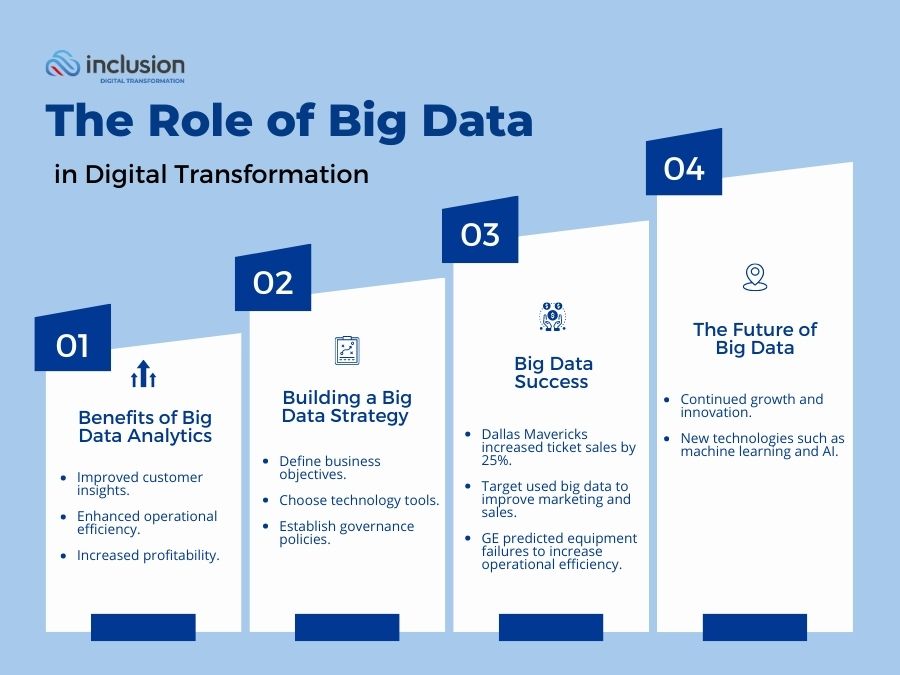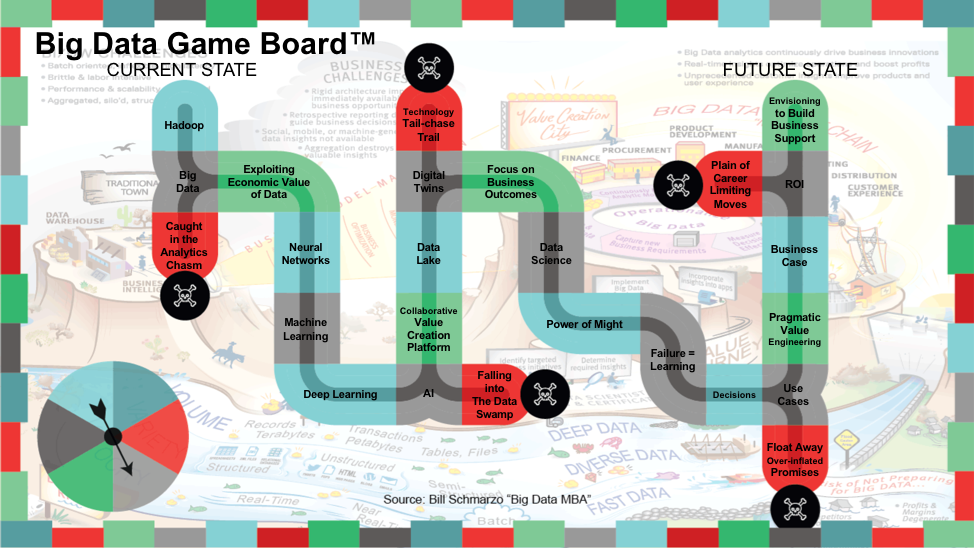Big data has become a critical asset for businesses looking to drive growth and stay competitive in today’s dynamic market. By effectively harnessing the vast amount of data generated and collected, companies can uncover valuable insights that can inform strategic decision-making and enhance overall performance.
Understanding Big Data
Big data refers to the large volume of structured and unstructured data that organisations collect on a daily basis. This data is characterised by its three Vs: volume, velocity, and variety.
- Volume refers to the sheer amount of data generated and collected. This data can be in the form of terabytes or even petabytes, which can be overwhelming for businesses to manage and analyse.
- Velocity refers to the speed at which data is produced and processed. In today’s fast-paced business environment, data is generated at an increasing rate, making it difficult for businesses to keep up.
- Variety refers to the different types and sources of data, from structured data, such as transaction records, to unstructured data, such as social media posts.
Video courtesy of @SimplilearnOfficial via YouTube Videos.
Harnessing big data can provide businesses with valuable insights that can inform strategic decision-making and enhance overall performance. By effectively leveraging big data, businesses can gain a competitive advantage, drive growth, and improve customer experiences.
Assessing Your Big Data Needs
Before embarking on a big data initiative, it’s important to take the time to assess your organisation’s specific data needs and objectives. This will help you identify the types of data you need to collect and analyse, as well as the specific business goals you want to achieve through big data analytics.
Start by evaluating the amount of data your business generates and collects. Identify the potential sources of big data within your organisation, such as customer interactions, transaction records, and social media activity. This will help you determine the volume and variety of data you need to collect and analyse.
Once you have a good understanding of your data landscape, you can start to identify the specific business goals you want to achieve through big data analytics. These goals might include:
- Improving operational efficiency.
- Enhancing customer experiences.
- Driving revenue growth.
- Staying competitive in today’s dynamic market.
Once you have identified your specific goals, you can begin to determine the types of data you need to collect and analyse in order to achieve them. For example, if your goal is to improve operational efficiency, you might need to collect data on sales trends, inventory levels, and supply chain performance.
Overall, assessing your big data needs is an essential step in leveraging data for business growth. By taking the time to identify your specific data needs and business goals, you can ensure that your big data initiatives are strategic and effective.
Video courtesy of @ReliableSoftwareInc via YouTube Videos.
Implementing Managed Support for Big Data
Implementing managed support for Big Data can provide businesses with numerous benefits, such as access to specialised expertise, improved scalability, and enhanced data security. To ensure the success of your big data initiative, it’s essential to choose the right managed support service provider.
When selecting a managed support service provider, consider factors such as their experience in handling big data projects, the technologies they support, and their track record in delivering results. Setting up and configuring big data tools and technologies can be complex, so it’s important to choose a provider that has a deep understanding of your specific data landscape and business objectives.
Managed support can also help you overcome common challenges associated with big data, such as data integration, data quality, and data governance. By partnering with an experienced managed support service provider, you can maximise the effectiveness of your big data initiatives and ensure that you are leveraging data for business growth.
Additionally, managed support services often offer advanced analytics tools and techniques, such as predictive modelling and machine learning. This can help you gain deeper insights into your data, uncover hidden patterns and trends, and make more informed decisions.
When it comes to implementing managed support for big data, there are several key considerations to keep in mind. These include:
- Determining your specific data needs and objectives.
- Evaluating potential managed support service providers.
- Ensuring data integration and compatibility.
- Addressing data quality and governance issues.
- Implementing advanced analytics tools and techniques.
Overall, implementing managed support for big data is an essential step in maximising the value of your big data initiatives. By choosing the right managed support service provider and following best practices for implementation, you can overcome common challenges, gain valuable insights, and drive business growth.
Video courtesy of @365DataScience via YouTube Videos.
Analysing Big Data for Business Growth
Once your big data infrastructure is in place, it’s time to start analysing the data to drive business growth.
Data visualisation tools can help you identify patterns and trends within your data, enabling you to extract actionable insights. Advanced analytics techniques such as predictive modelling and machine learning can help you make accurate forecasts and uncover hidden patterns in the data. By combining data from different sources and types, you can gain a holistic view of your business and customers, allowing you to make informed decisions based on evidence rather than intuition.
To ensure the success of your analytics initiatives, it’s essential to establish key performance indicators (KPIs) and track the outcomes of your projects against these KPIs. This will enable you to measure the impact of your big data initiatives on business growth and make adjustments as needed to maximise their effectiveness.
By fostering a culture of data-driven decision-making, you can drive continuous improvement and stay ahead of the curve in today’s data-driven business landscape.
Measuring Success and Continuous Improvement
Establishing key performance indicators (KPIs) is essential for measuring the impact of your big data initiatives on business growth. Track the outcomes of your big data projects against these KPIs and make adjustments as needed to maximise their effectiveness. By fostering a culture of data-driven decision-making, you can drive continuous improvement and stay ahead of the curve in today’s data-driven business landscape.
For a comprehensive take on Big Data strategies, make sure to check out Bill Schmarzo’s article, “The Big Data Game Board™” on LinkedIn Pulse. Schmarzo, the Dean of Big Data, CDO, and Chief AI Officer Whisperer, dives deep into the key factors for a successful Big Data initiative by introducing a creative and engaging concept.
This insightful piece will help you navigate the complexities of Big Data and unlock its potential for your organisation.
Conclusion
In conclusion, harnessing the power of big data is paramount for businesses seeking to achieve sustainable growth and competitive advantage.
By understanding your data needs, implementing managed support, analysing data effectively, and measuring success, you can unlock the full potential of big data for business growth. Embrace the data-driven future and start harnessing the power of big data today.
FAQ Corner
How can big data benefit my business?
Big data can provide valuable insights that drive strategic decision-making, enhance operational efficiency, and improve customer experiences, ultimately leading to business growth.
What are some common challenges in implementing big data initiatives?
Challenges may include data security concerns, data integration issues, and the need for specialised expertise in data analytics.
How can I get started with big data analytics?
Start by assessing your data needs, selecting a managed support service provider, and implementing the necessary tools and technologies for data processing and analysis.
What are some key performance indicators (KPIs) for measuring the success of big data projects?
KPIs may include metrics related to revenue growth, customer engagement, operational efficiency, and overall business performance.
How can I ensure data-driven decision-making in my organisation?
Encourage a culture of data-driven decision-making by providing training on data analysis tools and methodologies, fostering collaboration between data and business teams, and aligning data initiatives with strategic business objectives.
Ready to Unlock the Power of Big Data for Your Business?
Are you stuck in a data rut and unsure how to turn your data into actionable insights? Look no further! Our team of experts can help you harness the power of big data to drive business growth and stay ahead of the curve in today’s data-driven landscape.
With our managed support services and advanced analytics tools, you can gain a holistic view of your business and customers, uncover hidden patterns and trends in your data, and make informed decisions based on evidence rather than intuition.
So what are you waiting for? Take the first step towards a data-driven future and contact us today! Our team is ready and waiting to help you unlock the full potential of big data for your business.





